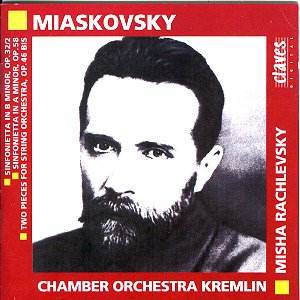 |
Nikolai MIASKOVSKY (1881-1950)
|
The latest 'buzz' on Miaskovsky is that Russian Disc, in collaboration with Records International and Evgeny Svetlanov, have released a limited edition box of the "Complete Symphonic Works" (though not the concertos). This includes all 27 symphonies with many of the other purely orchestral items as makeweights. These are the well known Sinfoniettas and Serenade, but also Alastor, Silence, Huldigung's Overture, Slav Rhapsody, Pathétique Overture, Concertino lirico, Divertissement and Links. This makes 16 very well filled CDs (all over 75' and most closer to 80'). There are no real notes to speak of - just a list for the contents of each disc with movement timings, and a very short essay on Miaskovsky by Svetlanov. I am grateful to Jacques Klein for this information. Go to the June 2001 section of the Records International site to get all the details.
Eric Schissel confirms that Marco Polo continue their dogged trudge through the symphonies with at least two more discs announced. The next one for issue, perhaps in November 2001, will feature symphonies 24 and 25 duplicating the now deleted and always difficult to find identical Melodiya coupling conducted by Svetlanov. They are also supposed to have up their sleeves another disc coupling Symphonies 3 and 21. I had always cherished hopes that Bohème International would record symphonies 4, 14 and 20 but nothing seems, so far, to have come of that.
The Svetlanov set will at last allow us to hear three great 'unknowns': the symphonies 4, 14 and 20! However the price of the set is frightening. Interestingly not all the Svetlanovs were recorded in 1991-1992. A number of the conductor's earlier 1960s and 1970s analogue tapes have been recycled including, so I understand, symphonies 3 and 22.
It would be unseemly to forget the isolated discs that have over the last decade fleshed out the picture of Miaskovsky. This Claves and an ASV CD present Miaskovsky the athletic, the pursuer of nostalgia, the seeker out of beauty decaying into sorrow.
The First Sinfonietta reeks of Elgar and Grieg; string elegies and the caprice of ghostly fiddlers caprice all well despatched by the Muscovites. The second movement's andante with its musingly murmurous susurration recollects the lapping music from Goossens' By The Tarn.
Fifteen years later and the music of the Second Sinfonietta is lower of profile though again elegiac as in Grieg's Holberg. It is all just a little sentimental lacking the vinegary blade of the First Sinfonietta. In the long andante elevato Miaskovsky gathers himself for a really superior coup of sentimentality well expounded by the Kremliners. Then comes the incendiary allegro con fuoco which is imparted real attack like Winter from Vivaldi's Seasons. The resonance of the band of presented in Claves' plush. You must not miss the string melody at 4.17 rather like the great tune in the Elgar Introduction and Allegro. It shares Op. 32 with a Serenade and a Lyric Concertino all three pieces are known as 'Diversions, or Three Collections of Games and Songs for Orchestra.'
While the First Sinfonietta is inventive and fresh, the Second is more conventionally polished. We know from his symphonies 24 and 25 which are contemporaneous that his inventiveness and inspiration was undamaged but perhaps he did not feel it necessary to engage afterburners for this work. Undemanding and unlikely to raise Cain.
The Two Pieces date from the year after the Second Sinfonietta. They are the waltz and andante from the Nineteenth Symphony (the one for windband) orchestrated for strings in 1945 (hence the Op. 46 bis designation). Three years later Miaskovsky stood condemned by the Central Committee asan anti-proletariat formalist. Tikhon Khrennikov turned up at his front door and demanded he sign a repentance speech. Miaskovsky was having nothing of that and neglect followed as surely as night followed day. The Two Pieces explore a vein of rare charm fresh as the First Sinfonietta and, dare I say, sounding far more natural in strings than on winds.
The contrast between this disc and ASV is partly to do with aural sheen and closeness of microphone placement. The sound difference between the ASV and the Claves might be compared to the saturated brilliance of a forced Kodachrome transparency as against AGFA or Perutz.
Rutland Boughton was an idealistic communist sympathiser much slighted by officialdom. His string music has been perceptively recorded on Hyperion. His Concerto for String Orchestra and Aylesbury Games bear close resemblances to Miaskovsky's string writing and moods.
The liner notes are by Manashir Yakubov and they trace the history of the composer and these pieces in more detail than those for the ASV disc which is also shorter in playing time.
Rob Barnett